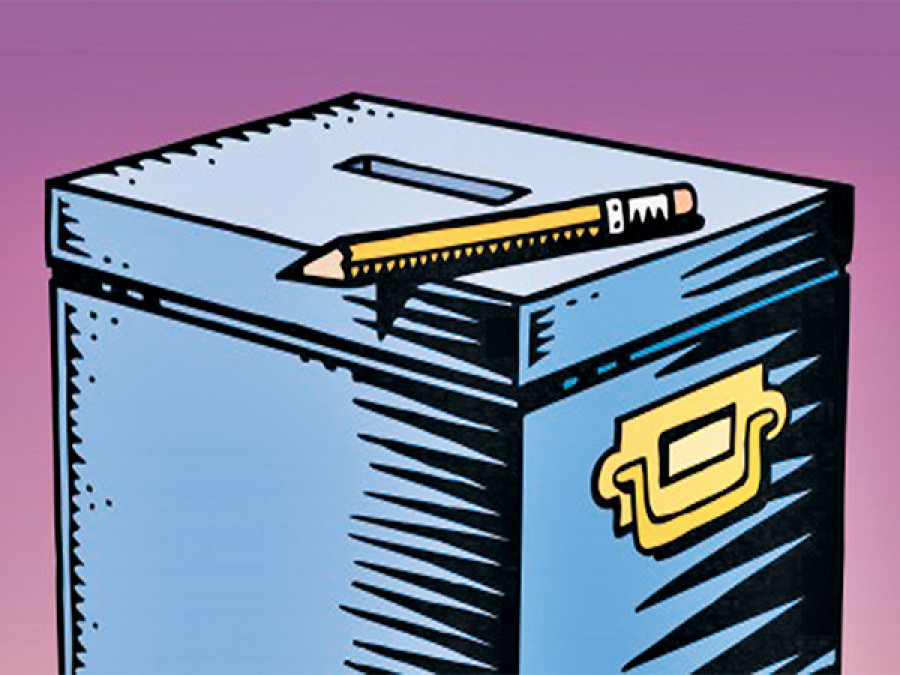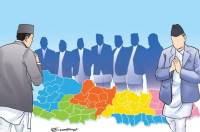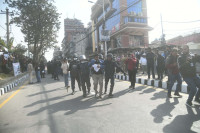Opinion
Refusing a referendum
Amidst some parties’ refusal to honour the people’s mandate, a referendum cannot be a solution
Khagendra N. Sharma
What kind of referendum?
A referendum presupposes a number of things: there should be the rule of law; there should be acceptance of universal principles of democracy like freedom, equality, majority rule, and the verdict of the people. There are certain countries like Switzerland where even regular laws are put to the people for their approval. There have been cases where the whole spirit of the constitution
has been put to the people for their approval. But I do not know of any country where the gamut of differences in political approach is put to the people
for their approval. This is simply impossible.
The Interim Constitution has declared Nepal a ‘secular, federal, democratic republic’. What are the issues where there are diametrically opposed views? I find them too many. In the first place, there is a clear division regarding the secularity of the state function. Secularity has been translated as ‘dharma nirapekshata’ meaning neutrality or non-interference in religion, which is widely misinterpreted as being anti-religion. If a referendum is done to determine this issue then there is a high chance that it will be rejected by confused people. Similarly, the issue of Nepal being republic has not yet been settled because of the clear lack of the constitution to uphold it. If this issue is put to a referendum, it might very well be rejected because the people have lost faith in the capacity of the leaders to run a republic.
But the test of a republic lies in its federalism and democracy. There have been heated discussions regarding the federal structure. Federal Nepal is there just in name. The Interim Constitution, which should have been put to rest at the end of two years, is still in operation because its successor was deliberately aborted and a second conception seems to be hanging in the balance. Thus, there is a strong under-current of anti-federalism. There are some who still claim that federalism will not only weaken the country, but demolish it. The election to the second Constituent Assembly (CA) clearly gave its mandate against the claims of federalism on single ethnic and/or regional identity basis. So, if a referendum is conducted on federalism on those bases, it will be rejected by the people.
Refusing the people
Meanwhile, democratisation is not being discussed at all because no party has real faith in democracy. Every party believes in their views being the people’s mandate. If not, the mandate of the second CA election should have been accepted as the people’s mandate. But the opposition parties are battling to reject the mandate of the people and press for their rejected agenda. This is a clear contradiction. If the parties believe in democracy, they should by all means abide by the decision of the people. This has happened in every democracy. The people have turned powerful parties away from the seats of power. But in those cases, the defeated parties have worked for decades to win back the support of the people. It takes time for the people to change their verdict. But the people are wise and they have made sound decisions in times of crisis.
Theoretically, if the parties refuse to abide by the decision of the people in a general election, then where is the guarantee that they will abide by the decision of the people in a referendum? Are they not the same people who voted in the general election? In a democracy, the people’s mandate is ascertained through an election. A referendum is the name of an election on one or a limited number of issues and the people’s decision is measured by the percentage of votes. If the parties have a different format of referendum, it should be acceptable to the people. If the people are being made to vote on a referendum or a general election, it should be supported by the faith of the leaders in the people. Without this precondition, a referendum is an exercise in futility. It has been our privilege that nobody can surpass our leaders in striving for futility.
Let me provide some concrete examples. Nepal conducted a referendum in 1980 to determine if the people wanted a reformed party-less Panchayat or a return to the multiparty system that was dismantled in 1960. The people voted in favour of the reformed Panchayat by a 10 percent majority. Despite claims of irregularities, the leader of the multiparty proponents, BP Koirala, accepted the verdict of the people. He had faith in democracy and the decision of the people.
Similarly, about a decade ago, Australia campaigned in a referendum to declare itself a republic, but the people voted to retain the British monarch as its suzerain power. It is not yet a republic. More recently, the people of Scotland voted in favour of staying within the United Kingdom in a referendum. But, I can make a forecast from what has been observed in the last decade that if a referendum is taken to determine whether the people want a unitary type of government against the call for single identity-based federalism, our opposition parties will oppose this popular verdict.
Elephant in the room
There are so many contentious issues that it would be hard to define the indicators of people’s choices in quantifiable terms. How many issues will be put to the people’s decision? The country has borne heavy electoral expenses twice already and it cannot bear this for the third time so soon. And, there is also a political force that has refused to participate in the political process with or without a referendum. How do you ensure that a referendum will make issues acceptable to all political forces?
My proposition is that the constitution is a flexible set of fundamental rules and principles that are capable of accommodating desired changes that become imperative in the course of time. Few changes may be necessary if the system is to be made functional and sustainable. The US constitution was made over two and a half centuries ago with 13 states in the union (federation). Now there are 50 states, but the constitution has undergone few changes, compared to many other nations, including India. We have over 100 ethnic nationalities and we are inciting them all to have single identity. Wisdom lies in articulating common identities with common aspirations. Nepal has been interpreted like an elephant in the eyes of six blind people. Will our leaders be able to retain the whole elephant?
Sharma is a freelance political analyst




 17.12°C Kathmandu
17.12°C Kathmandu










